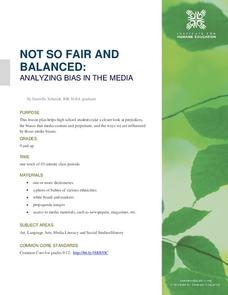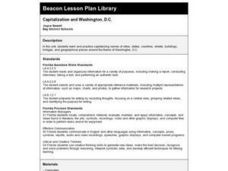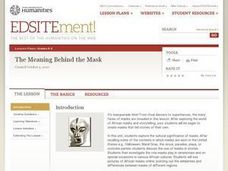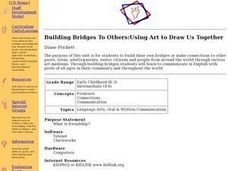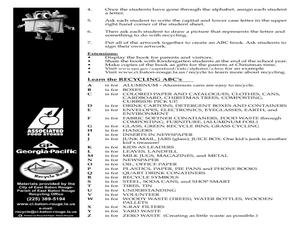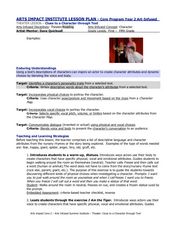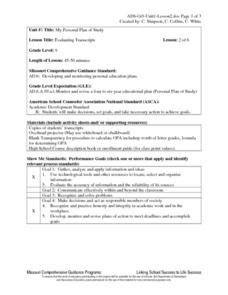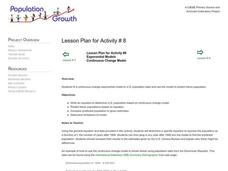Teach Engineering
Forms of Linear Equations
Linear equations are all about form. The fifth part in a unit of nine works with the different equivalent forms of linear equations. Class members become familiar with each form by identifying key aspects, graphing, and converting from...
University of Nottingham
Modeling Conditional Probabilities: 2
Bring the concept of conditional probability alive by allowing your classes to explore different probability scenarios. Many tasks have multiple solutions that encourage students to continue exploring their problems even after a solution...
Institute for Humane Education
Not So Fair and Balanced: Analyzing Bias in the Media
Life is not always fair. Who's heard that before? This same concept moves to a larger scale using prejudice and bias. Pupils discuss where prejudice attitudes derive and how they develop throughout life. Reading comprehension...
Smithsonian Institution
Trait Tracker
Help mice beat the odds with an exciting activity about traits. Biologists discover the role of diet and other factors on animal traits by participating in a simulation activity. Teams collect and evaluate data to understand how certain...
Overcoming Obstacles
Creating a Win-Win Situation
As part of a study of ways to resolve conflicts, class members examine the characteristics of win-win solutions and then practice win-win negotiations. They also examine the role of a mediator in conflict resolution and then script and...
Curated OER
What Have You Learned about the Mouth?
Learners sequence the steps in a normal day that can lead to tooth decay and describe how to maintain a healthy mouth.
Curated OER
Capitalization and Washington, D.C.
Second graders learn and practice capitalizing names of cities, states, countries, streets, buildings, bridges, and geographical places around the theme of Washington, D.C. through activities at learning centers in the classroom.
Curated OER
"Swamp Monsters" by Mary Blount Christian
Using the book Swamp Monsters by Mary Blount Christian, young readers discuss key vocabulary terms and make predictions about swamp monsters. They complete a Cloze activity, explore past-tense verbs, and categorize vocabulary words.
Curated OER
Vocabulary Strategy: Call of the Wild
Here is a strategy for groups to contribute to whole class vocabulary development. Teams (based on seating rows) work together to look up dictionary definitions of words from upcoming sections of the book (though previous sections seem...
Curated OER
Animal Research Pamphlet
Fourth graders perform research on an animal of choice. The reading of a novel is done prior to the research in order to establish context for the lesson. The use of the library for research is a key skill for this lesson.
Curated OER
The Meaning Behind the Mask
Students explore the world of African masks and storytelling. They create masks that tell stories of their own.
Curated OER
"Reality Math: Fact or Fiction"
Students investigate the use of math in everyday life. They investigate several occupations and pay scales. They complete spreadsheets that show how monthly bills can be organized using technology. They use word processing software to...
Curated OER
Building Bridges to Others
Practice communication skills in order to make meaningful connections to others. Through studying effective communication, kids make meaningful relationships that can affect the community in a positive way.
Curated OER
Scientists Find Fossils of T. rex Relative
Students read a news article that describes scientists finding a fossil of a T. Rex relative in China. They view a picture of the G. wuccai. They respond to the reading using details and by revisiting the anticipation set of questions.
Curated OER
The Right Character Produces Positive Outcomes
Students explore the meaning of character and why positive character is important. They explain the difference between character and personality. Students determine the difference between right and wrong character. They explore the...
Curated OER
The Recycle Alphabet
First graders recognize words associated with recycling. In this environmental lesson, 1st graders go through the alphabet and think of words associated with recycling that start with a letter. Students create a recycling ABC book.
Curated OER
Journey to Topaz: Directed Reading Thinking Activity
Have you used the directed reading thinking activity in your classroom? Doubling as either a prereading strategy, or a during reading strategy, it helps readers connect the historical background of the text to the text itself. As the...
Curated OER
Probability Experiment Simulation: Design and Data Analysis Using a Graphing Calculator
Seventh graders simulate probability experiments. Using a graphing calculator, 7th graders design, conduct, and draw conclusions from simulations or probability experiments. Students construct frequency tables and compare the...
Curated OER
Goodbye snail mail, hello email
Sixth graders send a picture as an attachment in an email and define email vocabulary. In this email lesson plan, 6th graders learn how to properly send an email and the etiquette that goes along with it.
Curated OER
Clues to a Character through Text
Readers will read a text and fill out a character map based on the characters in that text. They will explore different qualities of each character for their map. this can be modified to support younger learners. They will learn about...
Curated OER
Graduation Requirements
Ninth graders make decisions, set goals, and take necessary action to achieve goals. They review their school course descriptions book. Students review the graduation requirements from the book. They are given an handout "Graduation...
Curated OER
Evaluating Transcripts
Ninth graders review their transcripts and calculate their individual grade point averages. They brainstorm on how they can keep track of their progress in school and what information will follow them throughout their lives. Each student...
Curated OER
Exponential Models
Students fit a continuous change exponential model to U.S. population data and use the model to predict future population.
Curated OER
Research, Production, and Presentation of Abstract and Pop Art
Young scholars analyze Abstract Expressionism and Pop Art. They view and discuss artworks by Warhol, Lichenstein, Pollack, and Kandinsky, research a specific artist, and create an art piece in the style of their chosen artist.




